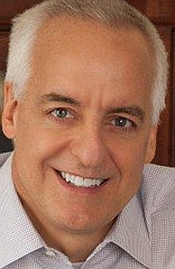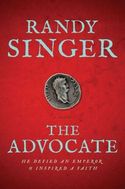
 I tell people that THE ADVOCATE feels like the book I was created to write; that it brings the three strands of my life together—pastor, lawyer and writer. (And reawakens a fourth—history teacher). Perhaps that’s because the idea for the book came from several different directions all at once.
I tell people that THE ADVOCATE feels like the book I was created to write; that it brings the three strands of my life together—pastor, lawyer and writer. (And reawakens a fourth—history teacher). Perhaps that’s because the idea for the book came from several different directions all at once.
The first strand came when I was wearing my lawyer hat and teaching advocacy at Regent Law School. We were studying the great trials in the history of the world and I was ranking them in order of importance. The first, at least in my mind, was eons ahead of the others: the trial of Christ. What could compare to that? The redemption of all mankind hinged on the outcome.
But the second was less clear. The Scopes monkey trial came to mind, unfortunately clearing the way for evolution to be taught in our schools. Or, on the more spiritual side, what about the trial of Martin Luther before the Diet at Worms? Then again, a few of my own cases seemed pretty significant.
I finally settled on a trial that not many people think about—the trial of the Apostle Paul in front of Nero. It seemed to me that the last half of the book of Acts was all about leading up to this one great moment—the world’s greatest missionary in front of the world’s most notorious tyrant. Christianity hanging in the balance. A generation of martyrs coming in its wake.
I became obsessed with that trial, a case we know little about.
Around the same time, a light was going on when I was wearing my pastor hat. I have always been committed to Christian apologetics—how to argue the case for the reality and authenticity of our faith. But I realized that traditional approaches to apologetics were no longer working. The millennial generation, which constitutes a big segment of the church I pastor, wasn’t convinced by the same “logic and evidence” approach that I had cut my teeth on. Instead, they were motivated by stories. Why? Because stories by-pass our intellectual defenses and go straight to the heart. So I began thinking about the type of story that might help people realize that our faith is “legit”—that Christ really does transform lives and change hearts.
That’s when God drew me to First Century Rome. These early believers, facing intense persecution, had nothing except a raw faith in a resurrected Messiah and the power of the Holy Spirit. Where did they find the courage and grace that transformed an Empire? If they could change the face of Rome, could we do it again two thousand years later in America?
With these questions bouncing around in my mind, I turned to Scripture. Dr. Luke seemed to me to be the Gospel writer most focused on apologetics through storytelling. He begins his Gospel with these words:
“With this in mind, since I myself have carefully investigated everything from the beginning, I too decided to write an orderly account for you, most excellent Theophilus, so that you may know the certainty of the things you have been taught.” Luke 1:3-4.
Who was this guy Theophilus? I found out that nobody really knew but there were lots of theories. I began believing that Theophilus was Paul’s court-appointed advocate for his trial in front of Nero. I decided to write Theophilus’s story, putting him at the trial of Jesus as an assessore, or law clerk, for Pontius Pilate. That way, I could tell the story of the two greatest trials in the history of the world from a front row seat.
But two questions remained. Would my publisher, Tyndale House, go for it? And what kind of research would I need to do?
The first question was answered in a phone call. When I described my idea to Karen Watson, my editor at Tyndale, she was immediately open. In fact, she said that Paul Mathews, the CFO at Tyndale, had asked her if she thought I would be open to writing a book on the trial of Jesus. I took that as a sign of God’s confirmation.
So I moved on to the second issue. How does a guy who writes contemporary legal thrillers suddenly become an author of historical fiction? And not just any historical fiction, but a book about the most pivotal moment in world history—the culmination of the ministry of Jesus and the rise of the early church?
I decided (and don’t hate me for this) that it required the great “sacrifice” of a trip to Rome. I really wanted this book to have the feel of someone writing from the First Century, not someone writing about the First Century. I knew that readers could instinctively tell the difference. If I wanted this book to work, I would have to become Theophilus, I would have to become intimately familiar with his culture and politics and beliefs. I needed more than head knowledge.
As the historians say, I would have to go to Rome and touch the stones.
Rather than tell you what that experience was like, I put together a short series of videos to show you. (Thanks to my wife, Rhonda, the iPhone camera-lady!) Some are humorous (or at least they try to be). Others are serious. You can view them here.
One of the most stirring moments in Rome came when we toured the Coliseum and I thought about the martyrs who had died there. We also walked the Gemonian Stairs, the same stone steps that Paul and Peter may have walked, facing certain death and turning the Empire upside-down in the process. And I asked myself a haunting question: Would I have had that kind of boldness? Do I now?
I imagined that Theophilus would have asked himself the same thing as he defended the fiery Paul in front of the volatile Nero. Am I willing to die for this cause?
It’s a question that I hope resonates throughout the pages of THE ADVOCATE. The Romans were fascinated with the mechanics of death. In Christianity, they confronted a religion that not only empowered people to live well, but also gave them the courage to die well. In fact, dying was like a second birth, a passage to eternal life made possible by the resurrection of the Nazarene.
And not even Nero, in all his narcissistic splendor, knew how to deal with that.
This faith was solid. This faith was real. My prayer is that THE ADVOCATE will inspire and encourage Christians to know today, as Luke phrased it, “the certainty of the things [we] have been taught.”
To comment on Randy Singer’s blog please click here.


No Comments
Comments are closed.